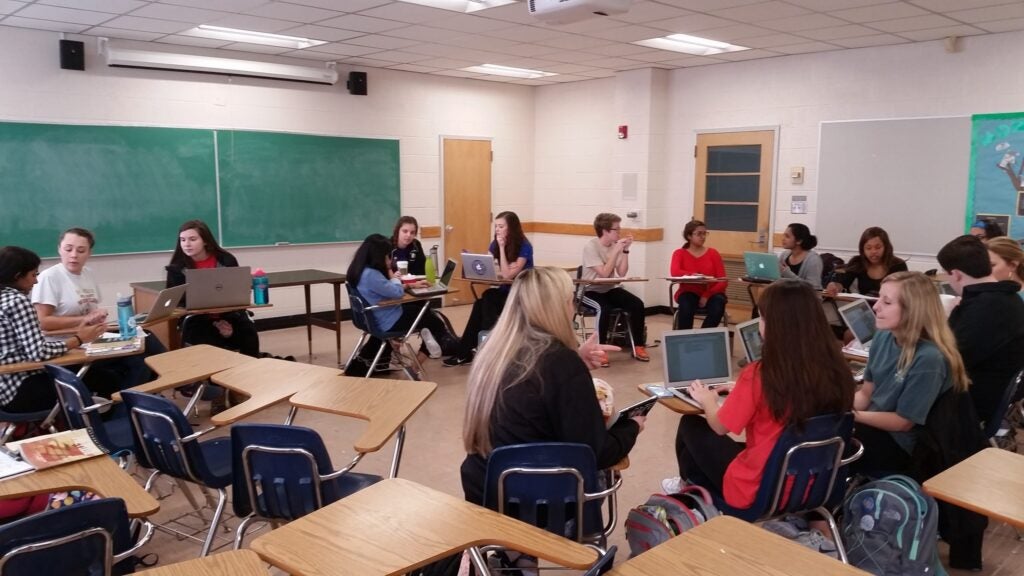February 13, 2016
A Collaborative Classroom: Honors Seminar Studies Stigma
By: Dr. Daniel Goldberg, Honors College Faculty Fellow
 In the course of conducting some research, I formed a basic question. The problem is that I I simply had no satisfactory answer to this question. The subject of my research here was stigma – specifically, why do humans seem to stigmatize each other so much? This is more of a puzzle than it seems. Here is why: Like most primates, humans are fundamentally prosocial creatures. Humans generally “do” better in communities; recent studies have documented that social isolation more accurately predicts sickness and death than obesity, high cholesterol, or high blood pressure. In contrast, stigma is predicated on alienation and exclusion, and is universally regarded as one of the most intensely antisocial experiences in human life. Yet stigma is a strikingly common feature of human social life. In other words, humans are among the most prosocial creatures on the planet, and nevertheless frequently seem to act in ways that are powerfully antisocial.
In the course of conducting some research, I formed a basic question. The problem is that I I simply had no satisfactory answer to this question. The subject of my research here was stigma – specifically, why do humans seem to stigmatize each other so much? This is more of a puzzle than it seems. Here is why: Like most primates, humans are fundamentally prosocial creatures. Humans generally “do” better in communities; recent studies have documented that social isolation more accurately predicts sickness and death than obesity, high cholesterol, or high blood pressure. In contrast, stigma is predicated on alienation and exclusion, and is universally regarded as one of the most intensely antisocial experiences in human life. Yet stigma is a strikingly common feature of human social life. In other words, humans are among the most prosocial creatures on the planet, and nevertheless frequently seem to act in ways that are powerfully antisocial.
Here, then was the paradox that was nagging at me: given that our social bonds are essential to a life of human flourishing, why do we stigmatize each other so much? This question immediately prompted other important questions, including but not limited to ‘[s]hould we try to diminish this tendency to stigmatize others?’ ‘If so, how?’ ‘Can we use stigma for just ends?’
In a flash, it came to me – not the answers, but rather an approach to seeking them: “teach and learn from the students in the ECU Honors College!” Since I was struggling to come up with a plausible answer, it seemed like a good idea to ask the Honors College students to help with it – to teach themselves and me in the bargain. So I designed a syllabus and a course proposal for what became our Spring 2016 Honors College Seminar entitled “Stigma, Its Paradoxes, and the Human Condition.”
We are about 5 weeks into our work in the course, and it has, as always, been a tremendous privilege to work with the dedicated and insightful students in the Honors College. My firm belief is that teaching and learning go hand-in-hand, and that seminars are our special opportunities as teachers to bring this idea home to roost. Thus, although I am an active researcher on the subject of stigma, especially as to health and illness, for our seminar, I am a guide, not an oracle. I do not dispense facts to the students so much as facilitate a deep discussion and analysis. The students teach themselves, they teach other, and they teach me.
Like everything I teach, the course takes an interdisciplinary approach, and explores the subject of stigma via readings and perspectives drawn from sociology, law, public health, literature, history, philosophy, religious studies, epidemiology, and public policy. It is a cliché, but teaching seminars in the Honors College is a true intellectual journey for me, and I hope for the students as well. I look forward to seeing where our path takes us.
Servire!

